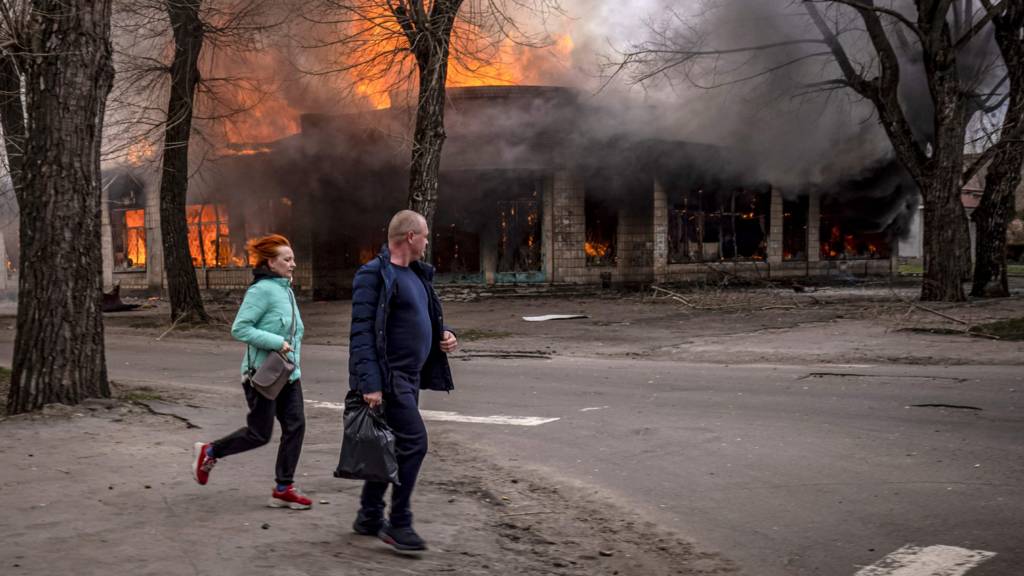
Live
Battles in Donbas will look like World War Two, says Ukraine
viewing this page
Updates from BBC correspondents: Jeremy Bowen and Joel Gunter in Kyiv, Yogita Limaye in Chernihiv, Jonathan Beale in Donbas, Tom Bateman in Zaporizhzhia, and Hugo Bachega, Anna Foster and Emma Vardy in Lviv
Related Video and Audio
RTL
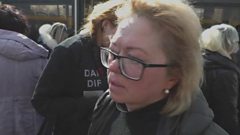
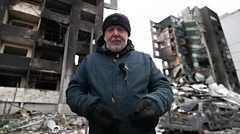


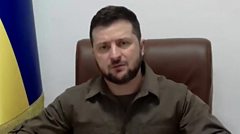
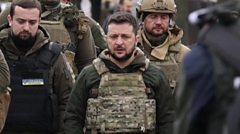
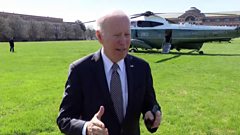
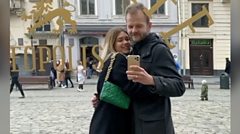
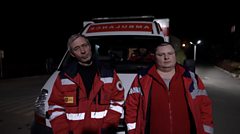
Live Reporting
Edited by Jude Sheerin
All times stated are UK
Get involved

Getty ImagesCopyright: Getty Images Video caption: Ukraine war: Destruction in the Ukrainian town of BorodyankaUkraine war: Destruction in the Ukrainian town of Borodyanka 
Getty ImagesCopyright: Getty Images A building bombed by the Russian army in Borodyanka.Image caption: A building bombed by the Russian army in Borodyanka. View more on twitterView more on twitter 
Getty ImagesCopyright: Getty Images A protester in Montreal outside the Russian consulate in FebruaryImage caption: A protester in Montreal outside the Russian consulate in February Analysis

Getty ImagesCopyright: Getty Images Gennady Kuzmin, Russia's deputy Permanent Representative, speaks to the United Nations General AssemblyImage caption: Gennady Kuzmin, Russia's deputy Permanent Representative, speaks to the United Nations General Assembly 

BBCCopyright: BBC Mykola tied himself to a wall so he could sleep standing up.Image caption: Mykola tied himself to a wall so he could sleep standing up. 
Getty ImagesCopyright: Getty Images 

.Copyright: . Analysis

Getty ImagesCopyright: Getty Images Ukrainian soldiers sit on a military vehicule in Severodonetsk, Donbas region.Image caption: Ukrainian soldiers sit on a military vehicule in Severodonetsk, Donbas region. 
Getty ImagesCopyright: Getty Images -
Ukraine's Foreign Minister Dmytro Kuleba asked Nato allies meeting in Brussels to provide "weapons, weapons, weapons" and said help was needed in “days not weeks”
-
Nato's secretary general Jens Stoltenberg said the alliance was "ready to do more" on supplying military equipment. Speaking after the summit, he said members "realise and recognise the urgency"
-
Russia has been suspended from the United Nations Human Rights Council by other members, because of its alleged war crimes
-
Kremlin spokesman Dmitry Peskov admitted Russia has sustained "significant losses" in
Ukraine
-
Russian troops were heard discussing killing civilians in the Ukrainian town of Bucha, in messages intercepted by German intelligence, according to German media
-
The BBC has found clear evidence Russian troops rounded up Ukrainian civilians in and around Obukhovychi, a village north west of Kyiv on the way to Belarus, and used them as human shields
-
A video has emerged which purports to show Ukrainian forces shooting and killing a captive Russian soldier. It's something the BBC has been trying to verify and analyse here.
-
The mayor of Dnipro has urged women, children and the elderly to leave the central city, as fears grow of intensified fighting in eastern Ukraine.

Getty ImagesCopyright: Getty Images Gennady Kuzmin, Russia Deputy Permanent Representative, speaks at the United Nations General Assembly.Image caption: Gennady Kuzmin, Russia Deputy Permanent Representative, speaks at the United Nations General Assembly. 

Getty ImagesCopyright: Getty Images People walk through debris on a street in Bucha, following the withdrawal of Russian forcesImage caption: People walk through debris on a street in Bucha, following the withdrawal of Russian forces 
EPACopyright: EPA 
Getty ImagesCopyright: Getty Images Ukraine's Minister of Foreign Affairs Dmytro Kuleba speaking at the Nato meetingImage caption: Ukraine's Minister of Foreign Affairs Dmytro Kuleba speaking at the Nato meeting 
BBCCopyright: BBC 
EPACopyright: EPA
Latest PostOur live coverage is moving
For technical reasons we are switching our live coverage to a new webpage here.
Please do join us for all the latest.
Zelensky: Destruction in Borodyanka 'much more horrific'
The destruction to the town of Borodyanka is "much more horrific" than what has already been uncovered in nearby Bucha, Ukrainian President Volodymr Zelensky has said in his newest Facebook address to the nation late on Thursday.
"They have started sorting through the ruins in Borodyanka," Zelensky said in his remarks from Kyiv.
"It's much more horrific there. There are even more victims of Russian occupiers."
Both towns are suburbs of Kyiv and saw fierce fighting in the battle for the capital.
Video content
'Twenty-six bodies pulled from rubble in Borodyanka'
Twenty-six bodies have been recovered from underneath the rubble of two destroyed apartment buildingsin Borodyanka, north west of Kyiv, according to Ukraine's prosecutor general.
Iryna Venediktova accused Moscow of deliberately targeting civilian areas, in a post on Facebook.
"There is no military site here," she said, adding that Russian forces "shelled residential infrastructure in the evenings, when there was a maximum amount of people home".
Venediktova claimed there was "evidence of the Russian forces' war crimes at every turn".
Nobel winner says he was attacked on Russian train
Russia's Nobel Peace Prize winning journalist Dmitry Muratov says he has been attacked with red paint laced with the solvent acetone on a train in Russia.
The attackers shouted "Muratov, this is for our boys," according to the Telegram channel of the new media outlet Novaya Gazeta Europe.
Muratov was co-awarded the peace prize in 2021 in recognition of his fight to defend freedom of expression in Russia.
His liberal Russian newspaper Novaya Gazeta suspended its activities in the country after warnings from the authorities, including over its coverage of the war in Ukraine.
Today, journalists from the paper announced they were launching Novaya Gazeta Europe, which would publish articles about Russia in different languages.
Read more
Canadian budget allocates funds for Ukraine
Canada will make C$1bn ($794m) available to Ukraine via the International Monetary Fund (IMF), according to the latest federal budget announced by the Liberal government in Ottawa.
The budget also allocates C$500m in military contributions to Ukraine.
"This support has helped respond to the humanitarian crisis, and ensure that the Ukrainian government can continue to provide essential services," the budget said.
More than 1.4m Ukrainians live in Canada, making it the second-largest in the world Ukrainian diaspora.
Unprecedented Russia suspension exposes divisions at UN
Imogen Foulkes
BBC News, Geneva
Russia’s suspension from the UN Human Rights Council is unprecedented.
Never before has the General Assembly taken such action against a permanent member of the UN Security Council.
The reports emerging from Ukraine have caused horror; an elected member of the human rights council (there are 47) is supposed to protect and promote human rights.
The images from Bucha suggest Russian troops have been doing the opposite.
That is why 93 UN member states backed the US-led move to suspend Russia. But there are 193 UN members, so less than half voted in favour: 58 abstained, 24 voted against, a further 18 were out of the room having what UN diplomats wryly call a "strategic coffee break".
Western nations view Russia’s suspension as essential if the UN is to fulfil its mandate on human rights, but others see it as deeply divisive.
Some of the countries which abstained, among them South Africa, objected to taking this decision before the council’s own inquiry into war crimes in Ukraine has even begun its work, let alone issued its report.
And what about other elected council members, like China? Will it be suspended if UN human rights commissioner Michelle Bachelet’s long-awaited report into the treatment of the Uighur population reveals major violations?
Today's vote is a huge blow for Russia, but it’s also an ominous reminder that the UN is finding it harder and harder to do its job.
Sharing space with the dead - horror outside Chernihiv
Yogita Limaye
BBC News, Yahidne
On the white, damp wall of the Yahidne school basement is a crude calendar, drawn in red crayon. It marks a period of unimaginable trauma - from 5 March to 2 April - for the people of this village.
Yahidne, 140km (80 miles) north-west of Kyiv, which is close to the borders with Belarus and Russia, was occupied by Russian soldiers for nearly a month.
They took men, women and children from their homes at gunpoint and held them in the basement of the local school for four weeks - around 130 people cramped into a room roughly 65 sq m (700 sq ft) in size.
Sixty-year-old Mykola Klymchuk was one of them. He offered to show us the basement.
"This was my half a metre of space. I was sleeping standing up," he said. His voice choked up and he started crying. "I tied myself to the railing here with my scarf so I wouldn't fall over. I spent 25 nights like this."
Mykola said you couldn't move for fear of stepping on people. About 40 or 50 children were among those held captive. The youngest was just two months old.
"During my time here, 12 people died," Mykola said. Most were elderly people. It's unclear what they died of, but Mykola believes some suffocated to death.
When people died, the bodies couldn't immediately be removed.
This meant that people, including children, lived amidst corpses for hours, and sometimes days, until they could be taken outside.
Read the report in full: Ukraine war: Sharing space with the dead - horror outside Chernihiv
Ukraine war in new phase - UK foreign secretary
The war has entered a "new and different phase", UK Foreign Secretary Liz Truss said, after today's meeting of Nato allies.
Ms Truss said there was now "a more concentrated Russian offensive" in Ukraine, and Nato had agreed to supply new and heavier equipment to fight it.
Speaking after the meeting of foreign ministers in Brussels, Ms Truss said: "Putin has changed his tactics but not his intent. He wants a hold over the whole of Ukraine."
She earlier said the UK would be "stepping up" its supply of weapons but has not yet detailed what this would include.
You can read about her comments here and we look at what Nato is and how it's helping Ukraine here.
What will the next few weeks look like in the Donbas?
Alice Evans
BBC News
Land warfare analyst Nick Reynolds, who works for the Royal United Services Institute (RUSI) think tank, has been filling us in on what the next few weeks of the war in Ukraine might look like, as Russia shifts its focus to the area in the south and east known as the Donbas.
Was Ukraine's foreign minister accurate when he said the fighting in the Donbas could be reminiscent of World War Two?
“Yes I think that’s accurate," Reynolds said. "With all the forces freed up from the north of Ukraine… we’re going to see a clash of arms on European soil that hasn’t been seen for generations."
Could Ukraine actually take back territory?
There are a lot of unknown factors here, Reynolds says.
Many Ukrainians will be buoyed up by the withdrawal of Russian forces in the north, but in the south and east “the map has still been slowly turning red”, he says, and that's even before any reinforcements have arrived from the north.
So Russia certainly still has some forwards momentum in the south and east, he says.
How much difference could Western arms make?
The weapons Western countries have so far sent to Ukraine have been game-changing but Nato has handed over a "significant amount of its stocks - and that supply was finite", Reynolds says.
Western arms will be "absolutely essential" in the coming weeks but it's hard to know how they can get them to where they need to go, he adds.
Ramping up industrial production of sophisticated weapons such as Javelins, NLAWs and Stingers is not easy, he says, as they have complex supply chains, He believes Western governments are struggling to keep up with demand.
Switchblade drones could “start to change things on the ground within a short timeframe” – but there’s “very little else” that could do so, he adds.
Weapons, weapons and weapons: What can Ukraine expect to be sent?
Paul Adams
BBC Diplomatic correspondent
Ukrainian Foreign Minister Dmytro Kuleba isn’t the only one warning of horrendous battles to come.
Western military officials expect Russia to throw everything into an offensive in the Donbas, in an effort to secure something that Moscow can describe as a victory.
The question is how long it’ll take before the Russians are ready and whether Ukraine will be able to withstand the pressure when it comes.
Hence the sense of urgency, with Kuleba warning on Thursday that additional military support must come in days, not weeks, saying that the three items on his agenda were "weapons, weapons, and weapons".
He and Nato Secretary General Jens Stoltenberg are deliberately coy about what equipment is being sent.
They don’t want the Russians to know exactly what is being supplied, something that would help Moscow organise its attack.
But the UK Foreign Secretary, Liz Truss, says there’s support within Nato for sending “new and heavier equipment”, and the MoD announced earlier that Ukrainian officials were in the UK earlier this week looking at “protected mobility vehicles,” which could include the heavily armoured Mastiff patrol vehicle.
With the Czech government sending Soviet-era T-72 tanks and the US announcing another $100m worth of Javelin anti-tank missiles, the flow of weapons is continuing, and the pace is picking up.
What's been happening today?
If you are just joining us, or need a recap, here's what's happened so far today.
In international diplomacy:
In Ukraine:
Russia UN rights council suspension is politically motivated - Kremlin
Moscow has said that the decision to suspend Russia from the United Nations Human Rights Council on Thursday was "illegal" and "politically motivated".
The vote at the United Nations General Assembly saw 93 member states vote to suspend Russia (58 abstained and 24 voted against).
Kremlin spokesman, Dmitry Peskov, told Sky News Russia was sorry about the decision and would continue to defend its interests "using every possible legal means".
It was only the second ever suspension of a country from the Human Rights Council. The first was Libya in 2011.
Russian forces 'discuss Bucha murders' in intercepted audio - reports
Damien McGuinness
BBC News, Berlin
Russian soldiers can be heard talking about the murder of Ukrainian civilians in military radio traffic intercepted by Germany's foreign intelligence (BND), according to several separate media reports.
The BND has audio material that appears to match the locations of bodies found in Bucha, the reports from German media say.
In one, Russians appear to talk about interrogating people and then shooting them.
In another, a soldier talks about shooting someone on a bike - which apparently matches a well-known photo showing a dead cyclist.
The intelligence was shared with German parliamentarians during a briefing on Wednesday.
However, a German security source told Reuters news agency that the findings on Bucha related to satellite images. “The radio transmissions cannot be clearly assigned to Bucha."
A German government spokesman confirmed Berlin has evidence that Russian troops committed the atrocities.
The reported intelligence also appears to show evidence that Wagner mercenaries are also fighting for Russia in Ukraine - backing up claims made by British intelligence earlier this week.
The group has been active over the past eight years in Ukraine, Syria and African countries, and has repeatedly been accused of war crimes and human rights abuses.
Kremlin admits 'significant losses of troops'
Russia has suffered "significant losses of troops", President Vladimir Putin's spokesman has said.
Dmitry Peskov was asked on Sky News whether the war had been a "humiliation", given that Russia had retreated from the capital, lost thousands of troops and that President Volodymyr Zelensky was still in power.
He said this was a "wrong understanding" of what was going on.
But asked again if Russia has lost thousands of troops, he said: "Yes, we have significant losses of troops and it's a huge tragedy for us."
He then added that the withdrawal from the Kyiv region and the northern city of Chernihiv was an "act of goodwill" to "lift tension" during peace talks.
In the interview, Peskov repeated Russia's reasons for what it describes as a "special military operation", saying Ukraine had become "anti-Russian" and Russia was "really nervous" as Nato had "started to move towards our boundaries".
Russia has previously said that 1,351 soldiers have been killed. The full death toll is not known, but a Nato official has been quoted in the US media as saying between 7,000 and 15,000, and there are similar US estimates.
A wrong righted with Russia's suspension from UN Human Rights Council - Blinken
US Secretary of State Antony Blinken has been speaking to reporters after today’s meeting of Nato foreign ministers in Belgium.
“There is a greater determination than ever to stand with Ukraine,” he said, and to inflict “even greater costs” on Russia for its invasion.
He also said for every Bucha - a city in which Russia has been accused of committing war crimes - there were likely to be more places in which atrocities were happening.
Blinken also welcomed the earlier vote to suspend Russia from the UN Human Rights Council, saying: “Today, a wrong was righted.”
Ukraine 'grateful' over Russia UN Human Rights Council suspension
Ukraine's Foreign Minister Dmytro Kuleba has responded to the news that Russia has been suspended from the UN's Human Rights Council.
Kuleba said: "War criminals have no place in UN bodies aimed at protecting human rights. Grateful to all member states which supported the relevant UNGA resolution and chose the right side of history."
How countries voted on Russia's suspension from UN Human Rights Council
More now on that vote moments ago to suspend Russia from the UN’s Human Rights Council during a session in New York.
Ninety-three countries voted in favour of the move, 24 against, and there were 58 abstentions.
Among the countries who supported the suspension were the US, EU nations, the UK, and of course Ukraine itself.
China, Syria, and Belarus were among those who voted against the motion.
And India, Egypt, and South Africa were among the nations which abstained.
You can see the full list here.
BreakingRussia suspended from UN Human Rights Council
The General Assembly of the United Nations has just voted to suspend Russia from its Human Rights Council during a session in New York.
It follows allegations of war crimes by Kremlin troops in Ukraine.
Before votes were cast, Ukraine’s ambassador to the UN Sergiy Kyslytsya accused Russia of “horrific” abuses – raising the issue of alleged civilian killings in the city of Bucha.
Russia’s own representative Gennady Kuzmin condemned the vote, and other nations including North Korea and Syria rallied behind him.
Ukraine says battle for Donbas will be like World War Two
Nato Secretary General Jens Stoltenberg has stated that allies are “ready to do more” to provide military equipment and support to Ukraine.
But Ukraine’s Foreign Minister Dmytro Kuleba, also speaking at a press conference earlier at Nato HQ in Brussels, said that help was needed in “days not weeks” if it was to avoid coming too late.
Articulating the severity of the situation, Kuleba compared the unfolding fighting in the Donbas region to the Second World War.
“[It] will remind you of the Second World War, with large operations... the involvement of thousands of tanks, armoured vehicles, planes, artillery.”
He said this would “not be a local operation” based on current observations of Russian preparations.
"Russia has its plan, we have ours - and the outcome of this battle will be decided on the battlefield," he added.
The Donbas is Ukraine's old coal and steel-producing area. The term refers to two big eastern regions, Luhansk and Donetsk. Russian-backed separatists declared "republics" in parts of the regions in 2014 and Russian forces have captured more territory since Vladimir Putin's invasion began in late February.
Russian forces executed civilians near Kyiv in apparent war crimes, Amnesty says
Russian forces executed civilians in various locations in the Kyiv region, according to new testimony published by Amnesty International.
The human rights organisation interviewed more than 20 people from towns and villages near the capital, some were witnesses to, or had direct knowledge of, the violence committed, it says.
"In recent weeks, we have gathered evidence that Russian forces have committed extrajudicial executions and other unlawful killings, which must be investigated as likely war crimes," says Amnesty International Secretary General Agnès Callamard.
"Testimonies shows that unarmed civilians in Ukraine are being killed in their homes and streets in acts of unspeakable cruelty and shocking brutality."
In one account given, a woman in a village east of Kyiv told Amnesty two Russian soldiers entered her house on 9 March, killed her husband, then repeatedly raped her at gunpoint while her young son hid in a boiler room nearby.
With Russian forces retreating from the north of Ukraine, disturbing stories of life under occupation have been emerging. The BBC's Jeremy Bowen has been told of Russian troops using villagers as human shields against Ukrainian counter-attacks.
Russia has repeatedly denied that its forces have committed atrocities, and sought to point the finger of blame elsewhere.